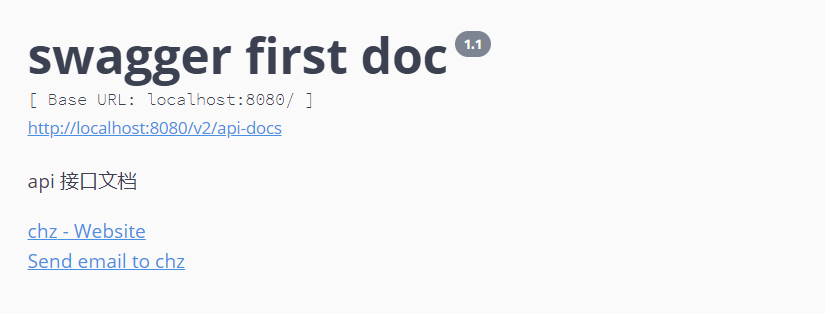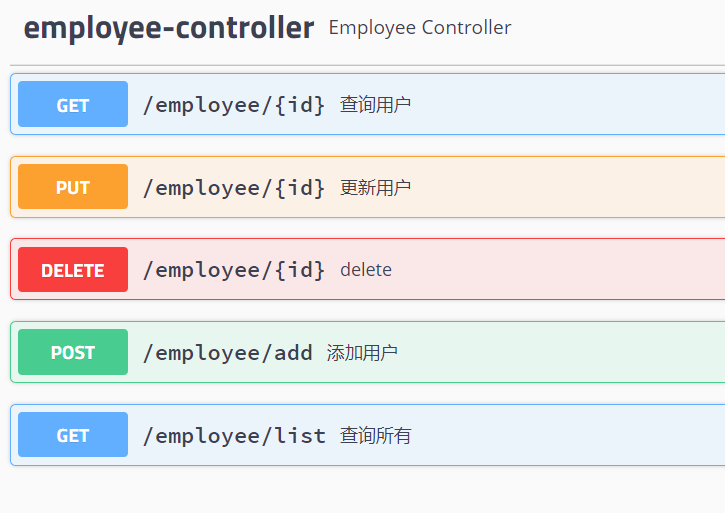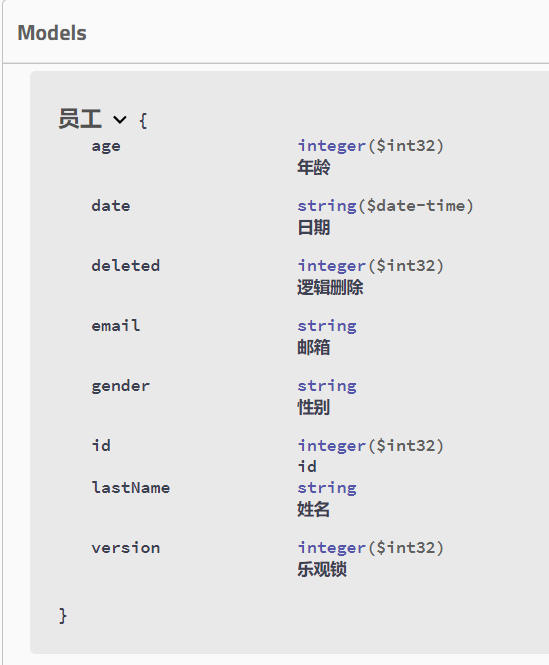Swagger2
#常见注解
-
@Api : 修饰整个类, 描述controller的作用
-
@ApiOperation : 描述一个类的一个方法, 或者说一个接口
-
@ApiParam: 单个参数描述
-
@ApiModel: 用在放回对象上,描述对象
-
@ApiProperty: 用对象来接收参数时, 描述对象的一个字段
-
@ApiResponse: Http响应其中1个描述
-
@ApiIgnore: 使用该注解忽略这个API
-
@ApiError: 发生错误返回的信息
-
@ApiImplicitParam: 一个请求参数
-
@ApiImplicitParmas: 多个请求参数
#依赖
<dependency>
<groupId>io.springfox</groupId>
<artifactId>springfox-swagger2</artifactId>
<version>2.9.2</version>
</dependency>
<!--可视化界面-->
<dependency>
<groupId>io.springfox</groupId>
<artifactId>springfox-swagger-ui</artifactId>
<version>2.9.2</version>
</dependency>
<!--二选一-->
<dependency>
<groupId>com.github.xiaoymin</groupId>
<artifactId>swagger-bootstrap-ui</artifactId>
<version>1.9.6</version>
</dependency>
springfox-swagger-ui 地址 http://localhost:8080/swagger-ui.html
swagger-bootstrap-ui 地址 http://localhost:8080/doc.html
#配置类
/**
* swagger2 配置类
* 开启swagger2
*/
@Configuration
@EnableSwagger2
public class SwaggerConf {
//版本
public static final String VERSION = "1.1";
/*
这里需要注入bean
*/
@Bean
public Docket createRestApi() {
return new Docket(DocumentationType.SWAGGER_2)
.apiInfo(apiInfo())
//会自动扫描当前模块下使用了Swagger2注解的类
.select()
//这些都是springboot中默认的一些url, 需要忽略
.paths(Predicates.not(PathSelectors.regex("/admin/.*")))
.paths(Predicates.not(PathSelectors.regex("/error.*")))
.build();
}
/*
设置api的信息 ,这些信息会展示在文档中
*/
private ApiInfo apiInfo() {
return new ApiInfoBuilder()
//设置文档标题
.title("swagger first doc")
//设置文档描述
.description("api 接口文档")
.contact(new Contact("chz", "https://www.chz.com", "kikochz@163.com"))
.version(VERSION)
.build();
}
#entity
@ApiModel(value = "员工")
@Data
@TableName("tbl_employee")
public class Employee implements Serializable {
private static final long serialVersionUID = 1L;
@ApiModelProperty(value = "id")
@TableId(value = "id", type = IdType.AUTO)
private Integer id;
@ApiModelProperty(value = "姓名")
private String lastName;
@ApiModelProperty(value = "邮箱")
private String email;
@ApiModelProperty(value = "性别")
private String gender;
@ApiModelProperty(value = "年龄")
private Integer age;
@ApiModelProperty(value = "乐观锁")
@Version
private Integer version;
@ApiModelProperty(value = "逻辑删除")
@TableLogic
private Integer deleted;
@ApiModelProperty(value = "日期")
@DateTimeFormat(pattern = "yyyy-MM-dd")
@JsonFormat(pattern = "yyyy-MM-dd", timezone = "GTM+8")
private LocalDateTime date;
}
#controller
@Api("employee controller")
@RestController
@RequestMapping("/employee")
public class EmployeeController {
@Autowired
private IEmployeeService employeeService;
@ApiIgnore//忽略该api
@RequestMapping("/hello")
public String hello() {
return "hello world";
}
/*
value是对方法的描述, notes是注意点
*/
@ApiOperation(value = "查询所有", notes = "注意实体类有乐观锁")
@GetMapping("/list")
public List<Employee> list() {
return employeeService.list();
}
@ApiOperation(value = "查询用户", notes = "通过id查询")
@GetMapping("/list/{id}")
public Employee get(@PathVariable("id") Integer id) {
return employeeService.getById(id);
}
@ApiOperation(value = "添加用户", notes = "传过来的参数可以不一样")
@PostMapping("/add")
public boolean add(@RequestBody Employee employee) {
return employeeService.save(employee);
}
/*
name 参数名
value 参数的简要描述
required 参数是否必须
dataTypeClass 参数的数据类型
parameterType http参数类型
*/
@ApiImplicitParam(name = "id", value = "用户id", required = true, dataType = "Integer", paramType = "path")
@DeleteMapping("/{id}")
public boolean delete(@PathVariable("id") Integer id) {
return employeeService.removeById(id);
}
@ApiOperation(value = "更新用户", notes = "根据用户id更新用户")
@ApiImplicitParams({
@ApiImplicitParam(name = "id", value = "用户id", required = true, dataTypeClass = Integer.class, paramType = "path"),
@ApiImplicitParam(name = "employee", value = "更新的参数", dataTypeClass = Employee.class)
})
@PutMapping("/{id}")
public boolean update(@PathVariable("id") Integer id, @RequestBody Employee employee) {
return employeeService.update(employee,
new UpdateWrapper<Employee>().eq("id", id));
}
#最后效果


